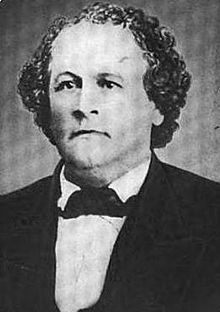Charles H. Constable | |
|---|---|
 | |
| Judge of the Illinois 4th Circuit Court | |
| In office July 1, 1861 – October 9, 1865 | |
| Preceded by | Justin Harlan |
| Succeeded by | Oliver L. Davis |
| Member of the Illinois Senate from the Wabash County district | |
| In office 1844–1848 | |
| Preceded by | Rigdon B. Slocumb |
| Succeeded by | John A. Campbell |
| Illinois Constitutional Delegate from Wabash County, Illinois | |
| In office 1847–1847 | |
| Personal details | |
| Born | July 17, 1817 Harford County, Maryland, U.S. |
| Died | October 9, 1865 (aged 48) Effingham, Illinois, U.S. |
| Resting place | Marshall, Illinois, U.S. |
| Political party |
|
| Spouse | Martha Hinde |
| Children |
|
| Relatives |
|
| Alma mater | University of Virginia |
| Occupation |
|
| Signature | |
Charles H. Constable (July 17, 1817 – October 9, 1865) was an American attorney, Illinois State Senator, judge, and real estate entrepreneur. He was raised in Maryland and graduated from the University of Virginia with a degree in Law. After settling in Illinois, he married the oldest daughter of Thomas S. Hinde, a pioneer and real estate developer. Initially, he practiced law in Mount Carmel, Illinois, the town founded by Hinde. He managed the business and real estate affairs of his father-in-law until Hinde died in 1846.
Later, Constable was active in Illinois politics and for a time was a close friend of Abraham Lincoln. During his life, Constable was a one-term Illinois State Senator, a delegate to the Illinois Constitutional Convention, and a one-term Circuit Court Judge. One source described Constable at the time of the Matson slave case to be "the best-educated lawyer at the bar." He is most commonly remembered for his decision to allow four Union deserters to go free during the Civil War. This decision led to Constable's arrest by Union military leaders and a trial in federal court. Constable argued that legal precedent supported his decision, and all charges were dropped in Federal court.
Following the dismissal of charges and his return to the bench, Constable and his family endured repeated threats, violence, and humiliation at the hands of partisan mobs angry at his release of the Civil War deserters. Not long after his release, Constable developed an addiction to morphine, then available over the counter. He died at the age of 48 from an overdose of the drug. One source stated the morphine overdose was a suicide. His wife, Martha Hinde Constable, died shortly after he did.